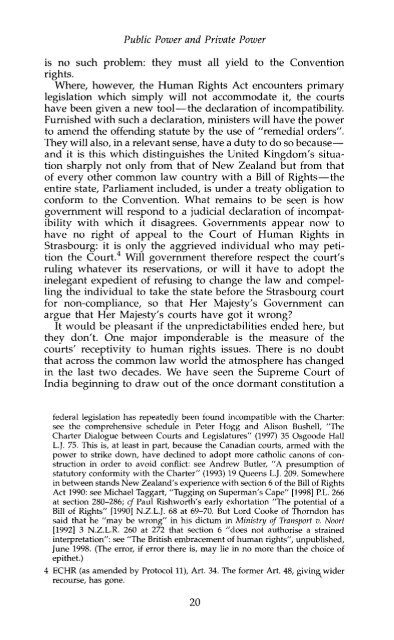LECTURES - College of Social Sciences and International Studies ...
LECTURES - College of Social Sciences and International Studies ...
LECTURES - College of Social Sciences and International Studies ...
Create successful ePaper yourself
Turn your PDF publications into a flip-book with our unique Google optimized e-Paper software.
Public Power <strong>and</strong> Private Power<br />
is no such problem: they must all yield to the Convention<br />
rights.<br />
Where, however, the Human Rights Act encounters primary<br />
legislation which simply will not accommodate it, the courts<br />
have been given a new tool—the declaration <strong>of</strong> incompatibility.<br />
Furnished with such a declaration, ministers will have the power<br />
to amend the <strong>of</strong>fending statute by the use <strong>of</strong> "remedial orders".<br />
They will also, in a relevant sense, have a duty to do so because—<br />
<strong>and</strong> it is this which distinguishes the United Kingdom's situation<br />
sharply not only from that <strong>of</strong> New Zeal<strong>and</strong> but from that<br />
<strong>of</strong> every other common law country with a Bill <strong>of</strong> Rights—the<br />
entire state, Parliament included, is under a treaty obligation to<br />
conform to the Convention. What remains to be seen is how<br />
government will respond to a judicial declaration <strong>of</strong> incompatibility<br />
with which it disagrees. Governments appear now to<br />
have no right <strong>of</strong> appeal to the Court <strong>of</strong> Human Rights in<br />
Strasbourg: it is only the aggrieved individual who may petition<br />
the Court. 4 Will government therefore respect the court's<br />
ruling whatever its reservations, or will it have to adopt the<br />
inelegant expedient <strong>of</strong> refusing to change the law <strong>and</strong> compelling<br />
the individual to take the state before the Strasbourg court<br />
for non-compliance, so that Her Majesty's Government can<br />
argue that Her Majesty's courts have got it wrong?<br />
It would be pleasant if the unpredictabilities ended here, but<br />
they don't. One major imponderable is the measure <strong>of</strong> the<br />
courts' receptivity to human rights issues. There is no doubt<br />
that across the common law world the atmosphere has changed<br />
in the last two decades. We have seen the Supreme Court <strong>of</strong><br />
India beginning to draw out <strong>of</strong> the once dormant constitution a<br />
federal legislation has repeatedly been found incompatible with the Charter:<br />
see the comprehensive schedule in Peter Hogg <strong>and</strong> Alison Bushell, "The<br />
Charter Dialogue between Courts <strong>and</strong> Legislatures" (1997) 35 Osgoode Hall<br />
L.J. 75. This is, at least in part, because the Canadian courts, armed with the<br />
power to strike down, have declined to adopt more catholic canons <strong>of</strong> construction<br />
in order to avoid conflict: see Andrew Butler, "A presumption <strong>of</strong><br />
statutory conformity with the Charter" (1993) 19 Queens L.J. 209. Somewhere<br />
in between st<strong>and</strong>s New Zeal<strong>and</strong>'s experience with section 6 <strong>of</strong> the Bill <strong>of</strong> Rights<br />
Act 1990: see Michael Taggart, "Tugging on Superman's Cape" [1998] P.L. 266<br />
at section 280-286; cf Paul Rishworth's early exhortation "The potential <strong>of</strong> a<br />
Bill <strong>of</strong> Rights" [1990] N.Z.L.J. 68 at 69-70. But Lord Cooke <strong>of</strong> Thorndon has<br />
said that he "may be wrong" in his dictum in Ministry <strong>of</strong> Transport v. Noort<br />
[1992] 3 N.Z.L.R. 260 at 272 that section 6 "does not authorise a strained<br />
interpretation": see "The British embracement <strong>of</strong> human rights", unpublished,<br />
June 1998. (The error, if error there is, may lie in no more than the choice <strong>of</strong><br />
epithet.)<br />
4 ECHR (as amended by Protocol 11), Art. 34. The former Art. 48, giving, wider<br />
recourse, has gone.<br />
20

















